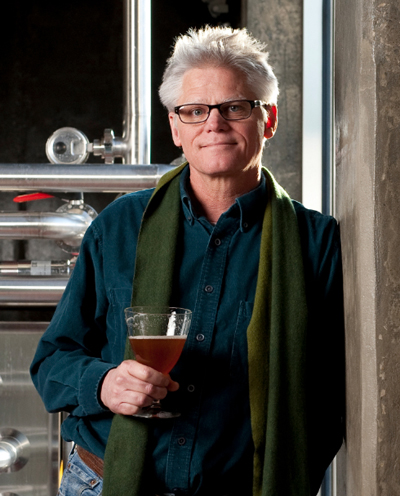with John McDonald
Boulevard Brewing Co.
What was your background before you turned to brewing?
I went to art school for college, then had to figure out a way to make a living. So I became a carpenter/cabinet maker and did that for about 15 years. I became a homebrewer in the mid-’80s and was enamored with the small breweries that were popping up around the country and thought that was something I’d like to do.
Does any of your art background transfer to brewing?
I’m very process-oriented. You look at all the things I’ve done, as an artist and a cabinetmaker, making something is what drives me and got me into brewing.
You’ve grown to be one of the larger craft breweries. How do you balance your growth with your ideals about beer being a local or regional activity?
We’ve always prided ourselves on being, first, a local brewery. Then we became a regional brewery. Four or five years ago, we began making our Smokestack line, which is our higher-end, bigger, more esoteric-type beers. The Smokestack line in general is higher alcohol, bigger beers; it makes sense for us to ship those farther.
Speaking of local tastes, I find it remarkable that your wheat beer is your most popular beer. Not many breweries lead with a wheat beer.
Right. That started for us back in the early ’90s, and it just fit the Midwestern palate. And ours is about as no-frills as they come. It’s a very simple recipe. It is very approachable, and that’s why we sell 100,000 barrels of it.
At the other end of the scale, where do the ideas for the Smokestack series come from?
You know it’s a lot easier coming up with the recipes than it is coming up with the names these days! I tell you, branding is a challenge—because there are so many small breweries and so many brands, so many names are taken. We’ve got a beer right now, we wanted to take to market six months ago, but we can’t get it branded. It’s pretty crazy.
I haven’t heard brewers mention that before. That’s a new problem in the craft beer industry!
To get back to your question, we have sort of a bottom-up approach. The R and D beers that we work on really come from the brewers. Our head brewer, Steven Pauwels, sort of orchestrates it all, but all of them contribute brewing ideas and recipes.
With a head brewer from Belgium, are you working a lot with barrels in the Smokestack Series?
Yes, we started, I think, four years ago. We have three beers we make that are produced just once a year, and we’re working on several sour beers, but we haven’t released any of those yet.
With a barrel, you are introducing an element that’s out of the brewer’s immediate control. Do you blend the beers afterward to get a desired profile?
Yes, we do. Especially our Bourbon Barrel Quad, because that beer gets aged 100 percent in wood, and you start getting some wild things going on in the older barrels. You have to select those carefully. Some barrels we don’t use for the Quad, and those go into our sour program.
That whole trend is very exciting. A couple of years ago, people were wondering what would happen after double-this and imperial-that beer. And now we know.
It’s interesting because, through science, we can start to look at what’s going on in these barrels more than people would have historically. You don’t have to just let things happen; you can start to affect what happens, even though it will still be variable.
Tell me about your sustainability program.
We’re zero-landfill here at the brewery, which means that nothing goes to the landfill. We’re lucky in Kansas City because Lafarge Cement has a waste energy pilot plant here. They’ll take anything combustible that we can’t figure out what to do with.
The other thing we did that I think no other brewer has is we started a glass processing company, called Ripple Glass. We built a $4 million state-of-the-art processing facility. We’ve taken glass recycling from maybe 3,000 tons a year to 15 to 18,000 tons a year here in Kansas City. There’s about 80,000 tons generated in Kansas City, so hopefully some day we’ll get close to that.
Julie Johnson
Julie Johnson is the technical editor of All About Beer Magazine.

Leave a Reply